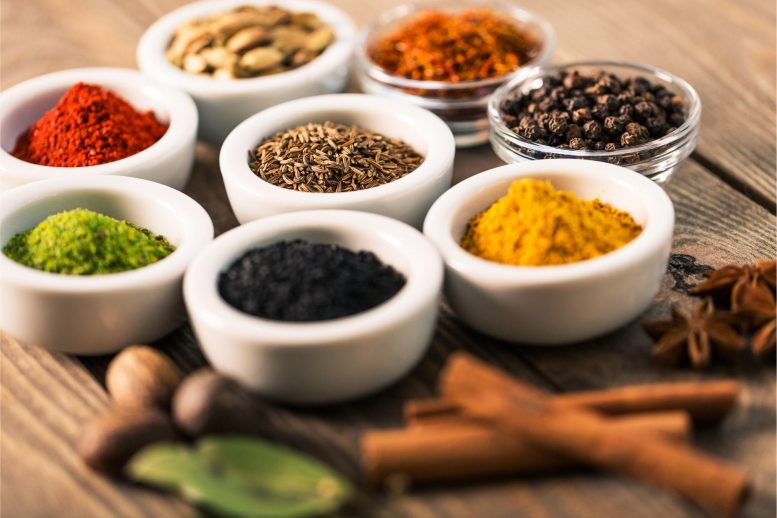Adding Herbs and Spices to Your Diet Could Improve Gut Health
Gut health is crucial for overall well-being, as the gut houses a diverse community of microorganisms known as the gut microbiome that plays a vital role in digestion, immunity, and mental health. A healthy gut microbiome is characterized by a diverse and balanced population of beneficial bacteria.
Two recent studies suggest that incorporating peanuts and herbs and spices into one’s diet can lead to an increase in the abundance of gut bacteria linked to improved health.
According to new research from Penn State, consuming a daily ounce of peanuts or a teaspoon of herbs and spices may improve the composition of gut bacteria, which is an indicator of overall health. Two separate studies conducted by nutritional scientists revealed positive effects on the gut microbiome as a result of small changes to the average American diet.
The gut microbiome is a vast community of microorganisms that reside in the human intestinal tract. Comprising trillions of bacteria, it plays a crucial role in regulating various bodily systems, such as metabolism and the immune system.
“Research has shown that people who have a lot of different microbes have better health, and a better diet, than those who don’t have much bacterial diversity,” said Penny M. Kris-Etherton, Evan Pugh University Professor of Nutritional Sciences, Penn State.
For the peanut study, which was published in the journal Clinical Nutrition, Kris-Etherton and her colleagues compared the effects of snacking on 28 grams (approx. 1 ounce) of peanuts per day, versus a higher carbohydrate snack—crackers and cheese. At the end of six weeks, participants who ate the peanut snack showed an increased abundance of Ruminococcaceae, a group of bacteria linked to healthy liver metabolism and immune function.
In the herbs and spices study, which was published in The Journal of Nutrition, scientists analyzed the impact of adding blends of herbs and spices — such as cinnamon, ginger, cumin, turmeric, rosemary, oregano, basil, and thyme — to the controlled diets of participants at risk for cardiovascular disease. The team examined three doses — about 1/8 teaspoon per day, a little more than 3/4 teaspoon per day, and about 1 1/2 teaspoon per day. At the end of four weeks, participants showed an increase in gut bacteria diversity, including an increase in Ruminococcaceae, most notably with the medium and high doses of herbs and spices.
“It’s such a simple thing that people can do,” said Kris-Etherton. “The average American diet is far from ideal, so I think everyone could benefit by adding herbs and spices. It’s also a way of decreasing sodium in your diet but flavoring foods in a way that makes them palatable and, in fact, delicious! Taste is really a top criterion for why people choose the foods they do.”
In both studies, the increase in Ruminococcaceae and bacterial diversity was viewed positively, as scientists continue to learn more about the connection between the gut microbiota and a spectrum of health factors, from blood pressure to weight. However, Kris-Etherton is quick to point out that more research is needed to understand all of the implications.
She said, “We need a lot more research on the microbiome to see what its proper place is in terms of overall health.”
References: “Peanuts as a nighttime snack enrich butyrate-producing bacteria compared to an isocaloric lower-fat higher-carbohydrate snack in adults with elevated fasting glucose: A randomized crossover trial” by Philip A. Sapp, Penny M. Kris-Etherton, Elke A. Arnesen, Jeremy R. Chen See, Regina Lamendella and Kristina S. Petersen, 13 August 2022, Clinical Nutrition.
DOI: 10.1016/j.clnu.2022.08.004
The work was supported by The Peanut Institute and Penn State’s Clinical & Translational Research Institute. This research was also supported by a grant to Juniata College from the Howard Hughes Medical Institute through the Precollege and Undergraduate Science Education Program, as well as by the National Science Foundation.
“Herbs and Spices Modulate Gut Bacterial Composition in Adults at Risk for CVD: Results of a Prespecified Exploratory Analysis from a Randomized, Crossover, Controlled-Feeding Study” by Kristina S Petersen, Samantha Anderson, Jeremy R Chen See, Jillian Leister, Penny M Kris-Etherton and Regina Lamendella, 2 September 2022, The Journal of Nutrition.
DOI: 10.1093/jn/nxac201
This study was funded by the McCormick Science Institute. In addition, the study was supported by the National Center for Advancing Translational Sciences, NIH. The study also received support for computational resources from the Howard Hughes Medical Institute through the Precollege and Undergraduate Science Education Program, as well as the National Science Foundation.
No Byline Policy
Editorial Guidelines
Corrections Policy
Source
